英语对话短文_英语故事短文英语故事短文_英语短文听力
- 格式:pdf
- 大小:1.91 MB
- 文档页数:7
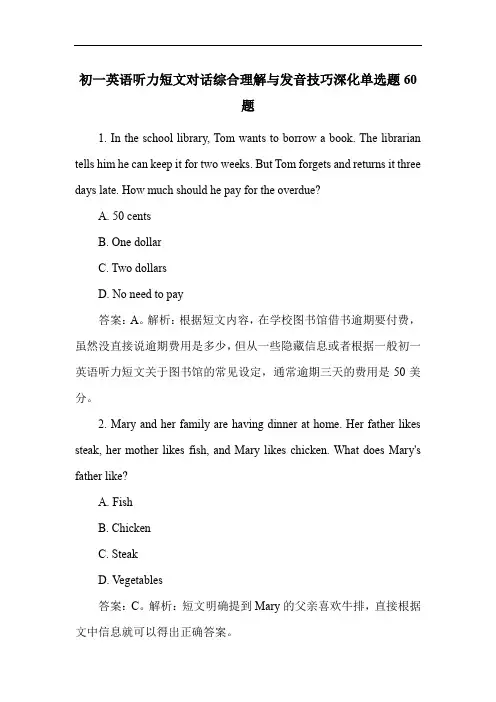
初一英语听力短文对话综合理解与发音技巧深化单选题60题1. In the school library, Tom wants to borrow a book. The librarian tells him he can keep it for two weeks. But Tom forgets and returns it three days late. How much should he pay for the overdue?A. 50 centsB. One dollarC. Two dollarsD. No need to pay答案:A。
解析:根据短文内容,在学校图书馆借书逾期要付费,虽然没直接说逾期费用是多少,但从一些隐藏信息或者根据一般初一英语听力短文关于图书馆的常见设定,通常逾期三天的费用是50美分。
2. Mary and her family are having dinner at home. Her father likes steak, her mother likes fish, and Mary likes chicken. What does Mary's father like?A. FishB. ChickenC. SteakD. Vegetables答案:C。
解析:短文明确提到Mary的父亲喜欢牛排,直接根据文中信息就可以得出正确答案。
3. At school, the teacher asks students to clean the classroom. Jack cleans the blackboard, Lucy sweeps the floor, and Tom wipes the desks. Who cleans the blackboard?A. LucyB. TomC. JackD. The teacher答案:C。
解析:短文中清晰表明Jack负责擦黑板,所以答案是C。
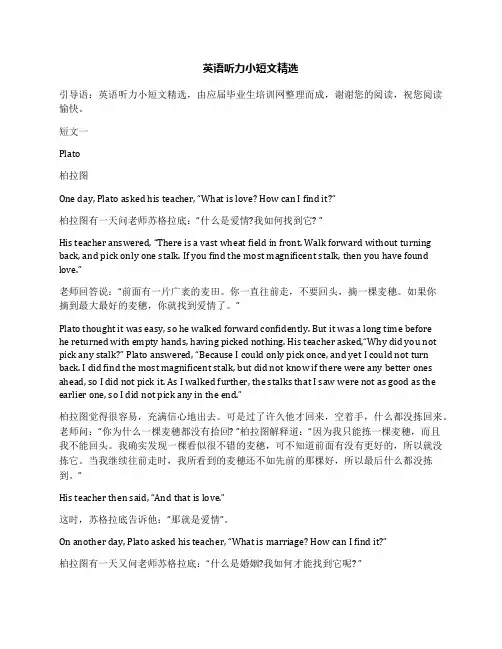
英语听力小短文精选引导语:英语听力小短文精选,由应届毕业生培训网整理而成,谢谢您的阅读,祝您阅读愉快。
短文一Plato柏拉图One day, Plato asked his teacher, “What is love? How can I find it?”柏拉图有一天问老师苏格拉底:“什么是爱情?我如何找到它? ”His teacher answered, “There is a vast wheat field in front. Walk forward without turning back, and pick only one stalk. If you find the most magnificent stalk, then you have found love.”老师回答说:“前面有一片广袤的麦田。
你一直往前走,不要回头,摘一棵麦穗。
如果你摘到最大最好的麦穗,你就找到爱情了。
”Plato thought it was easy, so he walked forward confidently. But it was a long time beforehe returned with empty hands, having picked nothing. His teacher asked,“Why did you not pick any stalk?” Plato answered, “Because I could only pick once, and yet I could not turn back. I did find the most magnificent stalk, but did not know if there were any better ones ahead, so I did not pick it. As I walked further, the stalks that I saw were not as good as the earlier one, so I did not pick any in the end.”柏拉图觉得很容易,充满信心地出去。
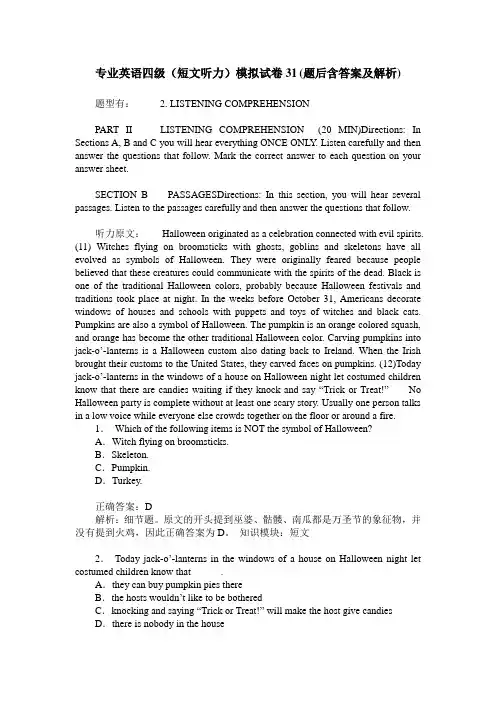
专业英语四级(短文听力)模拟试卷31(题后含答案及解析)题型有: 2. LISTENING COMPREHENSIONPART II LISTENING COMPREHENSION (20 MIN)Directions: In Sections A, B and C you will hear everything ONCE ONLY. Listen carefully and then answer the questions that follow. Mark the correct answer to each question on your answer sheet.SECTION B PASSAGESDirections: In this section, you will hear several passages. Listen to the passages carefully and then answer the questions that follow.听力原文:Halloween originated as a celebration connected with evil spirits.(11) Witches flying on broomsticks with ghosts, goblins and skeletons have all evolved as symbols of Halloween. They were originally feared because people believed that these creatures could communicate with the spirits of the dead. Black is one of the traditional Halloween colors, probably because Halloween festivals and traditions took place at night. In the weeks before October 31, Americans decorate windows of houses and schools with puppets and toys of witches and black cats. Pumpkins are also a symbol of Halloween. The pumpkin is an orange colored squash, and orange has become the other traditional Halloween color. Carving pumpkins into jack-o’-lanterns is a Halloween custom also dating back to Ireland. When the Irish brought their customs to the United States, they carved faces on pumpkins. (12)Today jack-o’-lanterns in the windows of a house on Halloween night let costumed children know that there are candies waiting if they knock and say “Trick or Treat!”No Halloween party is complete without at least one scary story. Usually one person talks in a low voice while everyone else crowds together on the floor or around a fire.1.Which of the following items is NOT the symbol of Halloween?A.Witch flying on broomsticks.B.Skeleton.C.Pumpkin.D.Turkey.正确答案:D解析:细节题。
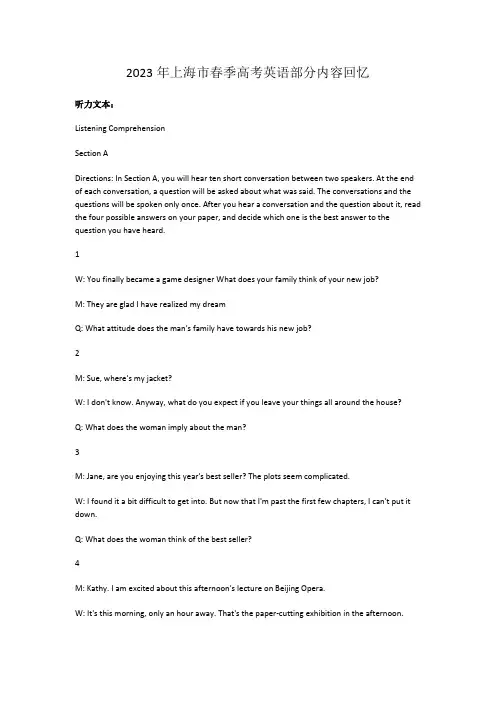
2023年上海市春季高考英语部分内容回忆听力文本:Listening ComprehensionSection ADirections: In Section A, you will hear ten short conversation between two speakers. At the end of each conversation, a question will be asked about what was said. The conversations and the questions will be spoken only once. After you hear a conversation and the question about it, read the four possible answers on your paper, and decide which one is the best answer to the question you have heard.1W: You finally became a game designer What does your family think of your new job?M: They are glad I have realized my dreamQ: What attitude does the man's family have towards his new job?2M: Sue, where's my jacket?W: I don't know. Anyway, what do you expect if you leave your things all around the house?Q: What does the woman imply about the man?3M: Jane, are you enjoying this year's best seller? The plots seem complicated.W: I found it a bit difficult to get into. But now that I'm past the first few chapters, I can't put it down.Q: What does the woman think of the best seller?4M: Kathy. I am excited about this afternoon's lecture on Beijing Opera.W: It's this morning, only an hour away. That's the paper-cutting exhibition in the afternoon.Q: What can be learned about the man?5M: I found this phone in the canteen. Its case says Linda. So I thought it might be yours.W: Yes, that's a weight off my mind.Thank you.Q: How does the woman most probably feel now?6W: Dad. I am running a marathon next Sunday. I wonder if you'd like to sponsor me. M: I don't see why not.Q: What does the man mean?7W: Dave, you're not taking any time off work for your honeymoon, are you?M: No. I know how busy we are at the moment.Q: What does the man mean?8W: There is no room left in my suitcase. I shall have shoes to pack.M: Fold your clothes properly, and you can maximize the amount you can store.Q: What are the speakers mainly talking about?9M: I've persuaded my brother to see the circus show with me next week.W: You two finally agreed on something.That must be the first time since I knew you two.Q: What does the woman imply about the man and his brother?10W: I wonder how my grandchildren are doing? I haven't seen them in ages.M: Why don't you just head off to see how they are?Q: What can be learned from the conversation?Section BDirections: In Section B, you will hear two short passages and one longer conversation. After each passage or conversation, you will be asked several questions. The passages and the conversation will be read twice, but the questions will be spoken only once. When you hear a question, read the four possible answers on your paper, and decide which one is the best answer to the question you have heard.Questions 11 through 13 are based on the following passage.Across the UK, a group of volunteer motorcyclists is helping hospitals by delivering blood. Angela Brown is one of them. She is on call for 80 hours each month. At very short notice, she can be woken in the night and find herself riding a motorbike with a vital delivery for a hospital. But she's not an employee of any hospital. She's just a volunteer, one of the 1400 advanced qualified riders of the Association of Blood Bikers. Last year, the Association's bikers responded to around 35000 rapid transport requests from 262 UK hospitals. Besides blood, the bikers also deliver surgical tools and medicine. Brown first discovered blood biking when she was on a course at the institute of advanced motorists. Her trainer, who himself was a blood biker, warned that their training ride might be stopped if he was called away. Under his influence, Brown started volunteering as a rider. She later discovered that blood bikers once helped her own nephew, Peter. He received blood delivered by a rider on New Year's Eve, 2015. Brown says being a blood biker is a way of helping the community and being on the bike at the same time.Now listen again.Questions:11. What is the talk mainly about?12. How many advanced qualified riders does the Association of Blood Bikers have?13. What can be learned about Angela Brown from the talk?Questions 14 through 16 are based on the following talk.Wearable devices are not just for humans anymore. A growing range of electronic callers and cameras can help you monitor your pets' activity and even emotional state. Was your cat happy? How much exactly did your dog eat today? Knowing the answers to such questions is becoming ever easier. This week, the insurance group. ASA, invested in a company called All4Pet, which makes the PetMe, a wearable activity monitor for dogs. The PetMe can feedback information on a dog's activity level and food intake. And healthier dogs may earn their owners a lower pet insurance fee. According to Andy Wells, the chief designer of the PetMe, there are a lot of challenges with dogs now. He says "about 4 million out of 9 million dogs in our country are too fat, and about 25% are left home alone". So pet care is worsening. Meanwhile, bills from petdoctors are rising each year, and so are insurance fees. Our purpose is to help owners keep their dogs fit and active in a fun way, which also helps insurance companies lower their costs. Our company, All4Pet, is using this data to build a database on dogs. So we can understand what makes one dog healthy and another overweight. Why certain conditions affect some dogs more than others?Now listen again.Questions:14. What can be learned about the PetMe from the talk?15. Why is the company All4Pet building a database on dogs?16. What is the talk mainly about?Questions 17 through 20 are based on the following conversation.W: Did you do anything special on Saturday?M: I spent the whole morning driving around to yard sales.W: Yard sales? I seem to have seen the signs that say 'Yard Sale' along the street.M: Very popular here. People often take out the things they don't need any more and sell them in their yards.W: I like this idea. What did you buy?M: I got some real treasures: a toy train, a pretty new tablet, and a fridge.W: Wow! What else was on sale?M: Practically anything. Clothes, household items... My friend bought a silver ring!W: Sounds like fun. What times are the sales?M: Usually on Saturdays and Sundays, from around 7 AM until 2 or 3 PM.W: That's pretty early for shopping.M: It is. But you have to be an early bird to get good stuff.W: I'll have to set my alarm early then.M: It'll be worth it if you find some good buys.W: I'd like to have a try. I'll watch for the signs on the lamp posts.M: I'll look in newspapers this Friday. If l see any good sale ads for this weekend, I'll let you know.W: Great! Thanks.Now listen again.Questions:17. What are the speakers mainly talking about?18. What did the man buy on Saturday?19. What does the man suggest the woman do to find some good stuff at yard sales?20.What will the man turn to for information about this weekend’s yard sales?That’s the end of Listening Comprehension.翻译1.他接到通知,实验结果一时半会还不出来。
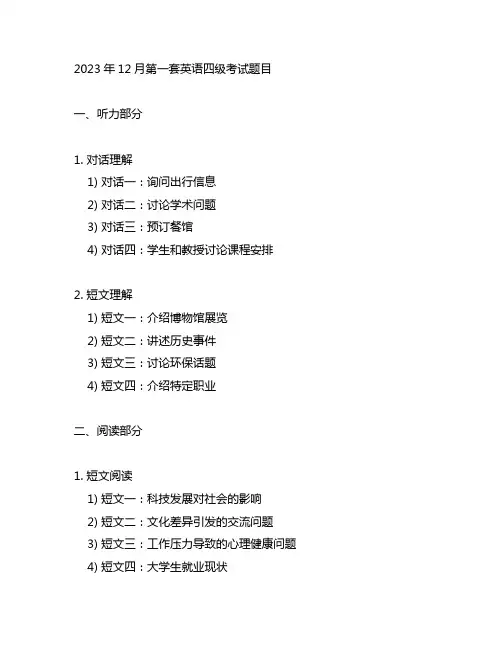
2023年12月第一套英语四级考试题目一、听力部分1. 对话理解1) 对话一:询问出行信息2) 对话二:讨论学术问题3) 对话三:预订餐馆4) 对话四:学生和教授讨论课程安排2. 短文理解1) 短文一:介绍博物馆展览2) 短文二:讲述历史事件3) 短文三:讨论环保话题4) 短文四:介绍特定职业二、阅读部分1. 短文阅读1) 短文一:科技发展对社会的影响2) 短文二:文化差异引发的交流问题3) 短文三:工作压力导致的心理健康问题4) 短文四:大学生就业现状2. 长篇阅读1) 篇一:讨论传统与现代教育方式2) 篇二:谈论家庭与工作的平衡问题三、写作部分1. 翻译1) 英译汉:一封商务邮件2) 汉译英:一则新闻报道2. 作文1) 选择题:社会热点话题2) 书面表达:求职信或投诉信2023年12月第一套英语四级考试题目是一个全面考察学生英语听力、阅读和写作能力的考试。
考生需要在有限的时间内,通过听力、阅读和写作三大部分的考试,全面展示他们的英语实力。
下面将对考题进行解析和讨论。
一、听力部分听力部分是英语四级考试的第一部分,其目的是考察考生的听力理解能力。
本次考试的听力部分包括对话理解和短文理解两个部分。
对话理解包括四组对话,涉及日常生活、学术讨论等多个方面,考查考生在日常交流中的听力能力。
短文理解包括四篇短文,内容涉及博物馆展览、历史事件、环保话题以及特定职业介绍等。
通过这部分的听力考试,可以全面评估考生的听力水平。
二、阅读部分阅读部分是考试的第二部分,主要考察考生的阅读理解能力。
短文阅读包括四篇短文,内容涉及科技发展、文化差异、工作压力和大学生就业现状等。
长篇阅读包括两篇篇章,分别讨论传统与现代教育方式以及家庭与工作的平衡问题。
通过阅读部分的考试,可以考察考生对各种不同领域的阅读理解能力。
三、写作部分写作部分是考试的第三部分,是对考生英语语言表达能力的综合考查。
写作部分分为翻译和作文两个部分。
翻译考查考生的汉译英和英译汉的能力,内容涉及商务邮件和新闻报道。
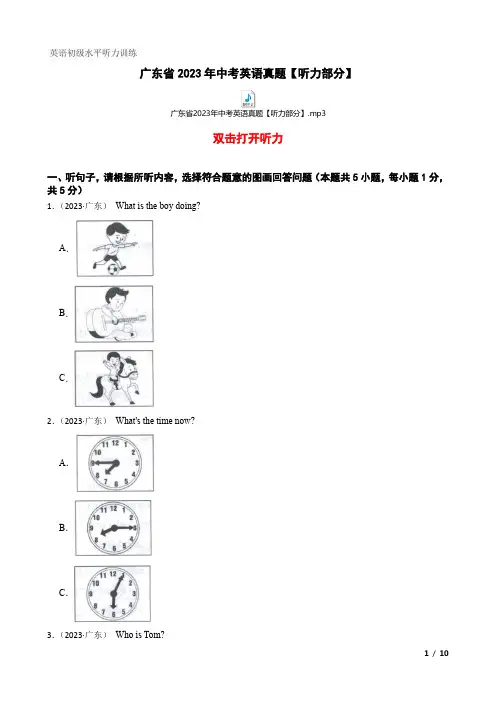
英语初级水平听力训练广东省2023年中考英语真题【听力部分】广东省2023年中考英语真题【听力部分】.mp3双击打开听力一、听句子,请根据所听内容,选择符合题意的图画回答问题(本题共5小题,每小题1分,共5分)1.(2023·广东)What is the boy doing?A.B.C.2.(2023·广东)What's the time now?A.B.C.3.(2023·广东)Who is Tom?A.B.C.4.(2023·广东)Where is the teapot?A.B.C.5.(2023·广东)How tall was Mary last year?A.B.C.二、听对话,请根据每段对话的内容回答问题,从每小题所给的三个选项中选出一个最佳答案(本题共10小题,每小题1分,共10分)6.(2023·广东)How will John go to the museum tomorrow?A.By bike.B.By bus.C.By car.7.(2023·广东)Which subject does Sam like best?A.English.B.History.C.Geography.8.(2023·广东)Why does Mandy like singing?A.Because it makes her brave.B.Because it makes her relaxed.C.Because it makes her popular9.(2023·广东)What does the woman order?A.Lemon juice.B.Green tea.C.Apple juice. 10.(2023·广东)Where will Lisa go for holiday?A.To the beach.B.To the lakeside.C.To the mountains.(2023·广东)听录音,回答问题。
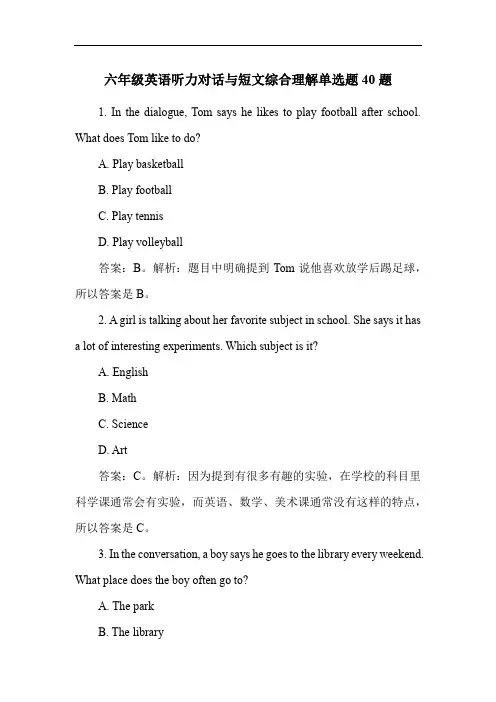
六年级英语听力对话与短文综合理解单选题40题1. In the dialogue, Tom says he likes to play football after school. What does Tom like to do?A. Play basketballB. Play footballC. Play tennisD. Play volleyball答案:B。
解析:题目中明确提到Tom说他喜欢放学后踢足球,所以答案是B。
2. A girl is talking about her favorite subject in school. She says it hasa lot of interesting experiments. Which subject is it?A. EnglishB. MathC. ScienceD. Art答案:C。
解析:因为提到有很多有趣的实验,在学校的科目里科学课通常会有实验,而英语、数学、美术课通常没有这样的特点,所以答案是C。
3. In the conversation, a boy says he goes to the library every weekend. What place does the boy often go to?A. The parkB. The libraryC. The zooD. The cinema答案:B。
解析:对话中男孩说他每个周末去图书馆,所以他经常去的地方就是图书馆,答案为B。
4. Two students are talking about their hobbies. One says he likes collecting stamps. What is his hobby?A. Collecting coinsB. Collecting stampsC. Collecting toysD. Collecting cards答案:B。
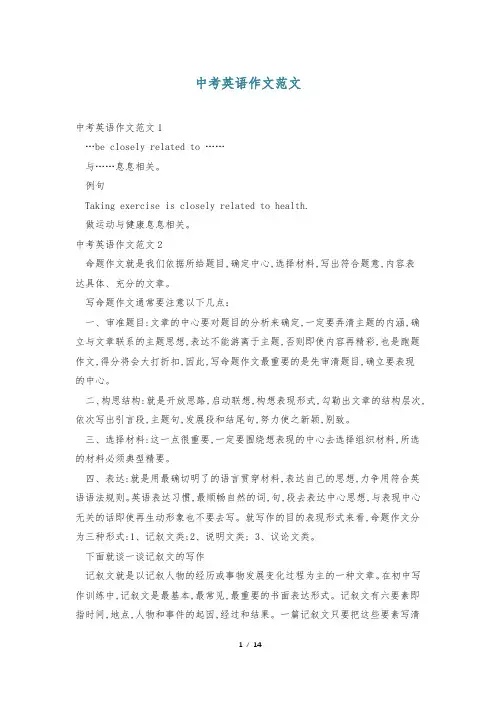
中考英语作文范文中考英语作文范文1…be closely related to ……与……息息相关。
例句Taking exercise is closely related to health.做运动与健康息息相关。
中考英语作文范文2命题作文就是我们依据所给题目,确定中心,选择材料,写出符合题意,内容表达具体、充分的文章。
写命题作文通常要注意以下几点:一、审准题目:文章的中心要对题目的分析来确定,一定要弄清主题的内涵,确立与文章联系的主题思想,表达不能游离于主题,否则即使内容再精彩,也是跑题作文,得分将会大打折扣,因此,写命题作文最重要的是先审清题目,确立要表现的中心。
二、构思结构:就是开放思路,启动联想,构想表现形式,勾勒出文章的结构层次,依次写出引言段,主题句,发展段和结尾句,努力使之新颖,别致。
三、选择材料:这一点很重要,一定要围绕想表现的中心去选择组织材料,所选的材料必须典型精要。
四、表达:就是用最确切明了的语言贯穿材料,表达自己的思想,力争用符合英语语法规则。
英语表达习惯,最顺畅自然的词,句,段去表达中心思想,与表现中心无关的话即使再生动形象也不要去写。
就写作的目的表现形式来看,命题作文分为三种形式:1、记叙文类;2、说明文类; 3、议论文类。
下面就谈一谈记叙文的写作记叙文就是以记叙人物的经历或事物发展变化过程为主的一种文章。
在初中写作训练中,记叙文是最基本,最常见,最重要的书面表达形式。
记叙文有六要素即指时间,地点,人物和事件的起因,经过和结果。
一篇记叙文只要把这些要素写清楚,文章就会内容具体, 眉目清晰,中心意思明确。
一般情况下,这六要素中的人物,时间,地点作为开端,要写在文章的开头。
事件,原因常作为记叙文的段落发展,又称为文章的主体部分,应该放在文章的中间。
结果作为记叙文的结局常放在文章的末尾处。
中考英语作文范文3Due to/Owing to/Thanks to + N/Ving因为……,……。
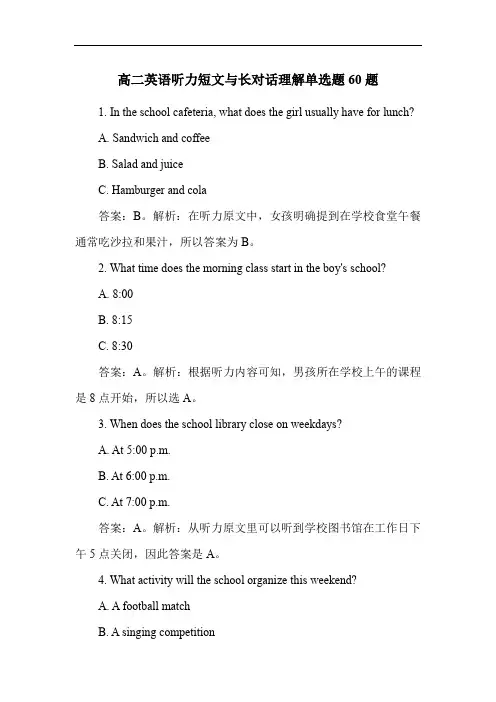
高二英语听力短文与长对话理解单选题60题1. In the school cafeteria, what does the girl usually have for lunch?A. Sandwich and coffeeB. Salad and juiceC. Hamburger and cola答案:B。
解析:在听力原文中,女孩明确提到在学校食堂午餐通常吃沙拉和果汁,所以答案为B。
2. What time does the morning class start in the boy's school?A. 8:00B. 8:15C. 8:30答案:A。
解析:根据听力内容可知,男孩所在学校上午的课程是8点开始,所以选A。
3. When does the school library close on weekdays?A. At 5:00 p.m.B. At 6:00 p.m.C. At 7:00 p.m.答案:A。
解析:从听力原文里可以听到学校图书馆在工作日下午5点关闭,因此答案是A。
4. What activity will the school organize this weekend?A. A football matchB. A singing competitionC. A painting exhibition答案:C。
解析:在听力材料中有提到本周末学校将组织一个绘画展览活动,所以答案为C。
5. How does the boy usually go to school?A. By bikeB. By busC. On foot答案:A。
解析:从听力原文能够得知男孩通常骑自行车去上学,所以正确答案是A。
6. In the conversation about traveling to Paris, what did the woman mention as the most impressive thing?A. The Eiffel TowerB. The Louvre MuseumC. French cuisineD. Parisian fashion答案:C。
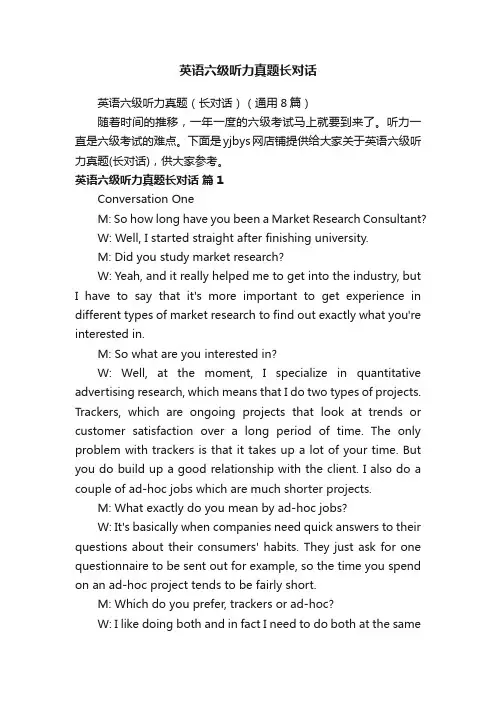
英语六级听力真题长对话英语六级听力真题(长对话)(通用8篇)随着时间的推移,一年一度的六级考试马上就要到来了。
听力一直是六级考试的难点。
下面是yjbys网店铺提供给大家关于英语六级听力真题(长对话),供大家参考。
英语六级听力真题长对话篇1Conversation OneM: So how long have you been a Market Research Consultant?W: Well, I started straight after finishing university.M: Did you study market research?W: Yeah, and it really helped me to get into the industry, but I have to say that it's more important to get experience in different types of market research to find out exactly what you're interested in.M: So what are you interested in?W: Well, at the moment, I specialize in quantitative advertising research, which means that I do two types of projects. Trackers, which are ongoing projects that look at trends or customer satisfaction over a long period of time. The only problem with trackers is that it takes up a lot of your time. But you do build up a good relationship with the client. I also do a couple of ad-hoc jobs which are much shorter projects.M: What exactly do you mean by ad-hoc jobs?W: It's basically when companies need quick answers to their questions about their consumers' habits. They just ask for one questionnaire to be sent out for example, so the time you spend on an ad-hoc project tends to be fairly short.M: Which do you prefer, trackers or ad-hoc?W: I like doing both and in fact I need to do both at the sametime to keep me from going crazy. I need the variety.M: Can you just explain what process you go through with a new client?W: Well, together we decide on the methodology and the objectives of the research. I then design a questionnaire. Once the interviewers have been briefed, I send the client a schedule and then they get back to me with deadlines. Once the final charts and tables are ready, I have to check them and organize a presentation.M: Hmm, one last question, what do you like and dislike about your job?W: As I said, variety is important and as for what I don't like, it has to be the checking of charts and tables.Questions 1 to 4 are based on the conversation you have just heard.Q1: What position does the woman hold in the company?Q2: What does the woman specialize in at the moment?Q3: What does the woman say about trackers?Q4: What does the woman dislike about her job?Conversation TwoW: Hello, I'm here with Frederick. Now Fred, you went to university in Canada?M: Yeah, that's right.W: OK, and you have very strong views about universities in Canada. Could you please explain?M: Well, we don't have private universities in Canada. They’re all public. All the universities are owned by the government, so there is the Ministry of Education in charge of creating the curriculum for the universities and so there is not much room for flexibility. Since it's a government operatedinstitution, things don't move very fast. If you want something to be done, then their staff do not have so much incentive to help you because he's a worker for the government. So I don't think it's very efficient. However, there are certain advantages of public universities, such as the fees being free. You don't have to pay for your education. But the system isn't efficient, and it does not work that well.W: Yeah, I can see your point, but in the United States we have many private universities, and I think they are large bureaucracies also. Maybe people don't act that much differently, because it’s the same thing working for a private university. They get paid for their job. I don’t know if they're that much more motivated to help people. Also, we have a problem in the United States that usually only wealthy kids go to the best schools and it's kind of a problem actually.M: I agree with you. I think it's a problem because you're not giving equal access to education to everybody. It’s no t easy, but having only public universities also might not be the best solution. Perhaps we can learn from Japan where they have a system of private and public universities. Now, in Japan, public universities are considered to be the best.W: Right. It's the exact opposite in the United States.M: So, as you see, it's very hard to say which one is better.W: Right, a good point.Questions 5 to 8 are based on the conversation you have just heard.Q5: What does the woman want Frederick to talk about?Q6: What does the man say about the curriculum in Canadian universities?Q7: On what point do the speakers agree?Q8: What point does the man make at the end of the conversation?英语六级听力真题长对话篇2Lecture 1The negative impacts of natural disasters can be seen everywhere. In just the past few weeks, the world has witnessed the destructive powers of earthquakes in Indonesia, typhoons in the Philippines, and the destructive sea waves that struck Samoa and neighboring islands.A study by the Center for Research on the Epidemiology of Disasters finds that, between 1980 and 2007, nearly 8,400 natural disasters killed more than two-million people. These catastrophic events caused more than $1.5 trillion in economic losses.U.N. weather expert Geoffrey Love says that is the bad news. "Over the last 50 years, economic losses have increased by a factor of 50. That sounds pretty terrible, but the loss of life has decreased by a factor of 10 simply because we are getting better at warning people. We are making a difference. Extreme events, however, will continue to occur. But, the message is that they may not be disasters."Love, who is director of Weather and Disaster Risk Reduction at the World Meteorological Organization, says most of the deaths and economic losses were caused by weather, climate, or water-related extremes. These include droughts, floods, windstorms, strong tropical winds and wildfires.He says extreme events will continue. But, he says extreme events become disasters only when people fail to prepare for them."Many of the remedies are well-known. From a planning perspective, it is pretty simple. Build better buildings. Don’tbuild where the hazards will destroy them. From an early-warning perspective, make sure the warnings go right down to the community level. Build community action plans. ”The World Meteorological Organization points to Cuba and Bangladesh as examples of countries that have successfully reduced the loss of life caused by natural disasters by taking preventive action.It says tropical cyclones formerly claimed dozens, if not hundreds of lives, each year, in Cuba. But, the development of an early-warning system has reversed that trend. In 2008, Cuba was hit by five successive hurricanes, but only seven people were killed.Bangladesh also has achieved substantial results. Major storm surges in 1970 and 1991 caused the deaths of about 440,000 people. Through careful preparation, the death toll from a super tropical storm in November 2007 was less than 3,500.Q16. What is the talk mainly about?Q17. How can we stop extreme events from turning into events?Q18. What does the example of Cuba serve to show?Lecture 2As U.S. banks recovered with the help of American government and the American taxpayers, president Obama held meetings with top bank execut ives, telling them it’s time to return the favor. “The way I see it are banks now having a greater obligation to the goal of a wide recovery,” he said. But the president may be giving the financial sector too much credit. “It was in a free fall, and it was a very scary period.” Economist Martin Neil Baily said. After the failure of Lehman Brothers, many of the world’s largest banks feared the worst as the collapse ofthe housing bubble exposed in investments in risky loans.Although he says the worst is just over, Bailey says the banking crisis is not. More than 130 US banks failed in 2009. He predicts high failure rates for smaller, regional banks in 2010 as commercial real estate loans come due."So there may actually be a worsening of credit availability to small and medium sized businesses in the next year or so."Analysts say the biggest problem is high unemployment, which weakens demand and makes banks reluctant to lend. But US Bankcorp chief Richard Davis sees the situation differently."We're probably more optimistic than the experts might be.With that in mind, we're putting everything we can, lending is the coal to our engine, so we want to make more loans. We have to find a way to qualify more people and not put ourselves at risk."While some economists predict continued recovery in the future, Baily says the only certainty is that banks are unlikely to make the same mistakes - twice. "You know, forecasting's become a very hazardous business so I don't want to commit myself too much. I don't think we know exactly what's going to happen but it's certainly possible that we could get very slow growth over the next year or two.”If the economy starts to shrink again, Baily says it would make a strong case for a second stimulus -- something the Obama administration hopes will not be necessary.Q19. What dose president Obama hope the banks will do?Q20. What is Martin Neil Baily’s prediction about the financial situation in the future?Q21. What does U.S. Bankcorp chief Richard Davis say about its future operation?Q22. What does Martin Neil Baily think of a second stimulus to the economy?英语六级听力真题长对话篇3Section ADirections: In this section, you will hear two long conversations. At the end of eachconversation, you will hear four questions. Both the conversation and the questions will bespoken only once. After you hear a question, you must choose the best answer. from the fourchoices marked A), B),C) and D). Then mark the corresponding letter on Answer Sheet 1 with asingle line through the centre.注意:此部分试题请在答题卡1上作答。
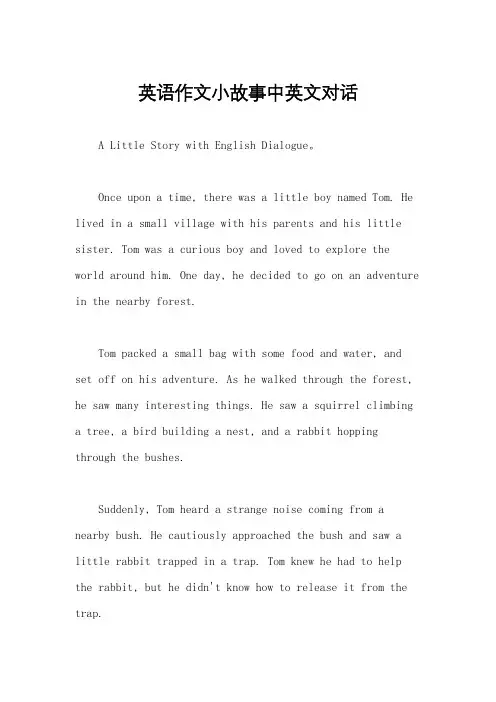
英语作文小故事中英文对话A Little Story with English Dialogue。
Once upon a time, there was a little boy named Tom. He lived in a small village with his parents and his little sister. Tom was a curious boy and loved to explore the world around him. One day, he decided to go on an adventure in the nearby forest.Tom packed a small bag with some food and water, and set off on his adventure. As he walked through the forest, he saw many interesting things. He saw a squirrel climbing a tree, a bird building a nest, and a rabbit hopping through the bushes.Suddenly, Tom heard a strange noise coming from a nearby bush. He cautiously approached the bush and saw a little rabbit trapped in a trap. Tom knew he had to help the rabbit, but he didn't know how to release it from the trap.Just then, a wise old owl flew down from a nearby tree. "Hello, Tom," said the owl. "What seems to be the problem?"Tom explained the situation to the owl, and the owl said, "Don't worry, Tom. I can help you release the rabbit from the trap. But first, we need to be careful not to scare the rabbit."Together, Tom and the owl carefully released the rabbit from the trap. The rabbit was so grateful that it hopped over to Tom and nuzzled against his leg."Thank you for saving me," said the rabbit."You're welcome," said Tom. "I'm just happy to help."As Tom continued on his adventure, he realized that he had learned an important lesson. He had learned that even the smallest acts of kindness can make a big difference in the world.English Dialogue:Tom: Wow, this forest is so beautiful! I wonder whatI'll find.Squirrel: Hi there, little boy! What are you doing in our forest?Tom: I'm just exploring. What are you doing?Squirrel: I'm climbing this tree to gather some nutsfor the winter.Tom: That's so cool! Can I watch?Squirrel: Sure, but be careful not to scare me.Bird: Hey, you two! What's going on?Tom: Hi there! I'm just watching the squirrel climb the tree.Bird: Oh, I see. I'm building a nest for my eggs. Do you want to help?Tom: Yes, please!Rabbit: Help! Help!Tom: What's that noise?Owl: Hello, Tom. What seems to be the problem?Tom: There's a rabbit trapped in a trap. Can you help me release it?Owl: Of course, but we need to be careful not to scare the rabbit.Tom: Okay, I'll be careful.Rabbit: Thank you for saving me!Tom: You're welcome. I'm just happy to help.Owl: You have learned an important lesson today, Tom. Even the smallest acts of kindness can make a big difference in the world.Tom: Yes, I have. Thank you for your help, owl.。
2013年6月英语四级真题听力短文原文2013年6月大学英语四级考试Part III Listening Comprehension长对话答案+解析Conversation 1【听力原文】W: Good afternoon, Mr. Jones. I am Teresa Chen, and I’ll be interviewing you. How are you today?M: I am fine, thank you. And you, Miss Chen?Good, Thanks.W: Can you tell me something about your experiences in this kind of work?M: Well, for several years, I managed a department for the Brownstone Company in Detroit, Michigan. Now I work part time because I also go to school at night. I’m g etting a business degree.W: Oh, how interesting. Tell me, why do you want to leave your present job?M: I’ll finish school in a few months, and I’d like a full-time position with more responsibility.W: And why would you like to work for our company?M: Because I know your company’s work, and I like it.W: Could you please tell me about your special skills and interests?M: Of course, I’m good at computers and I can speak Spanish. I used to take classes in Spanish at the local nd I like travelling a lot.W: Can you give me any references?M: Yes, certainly. You can talk to Mr. McCaw, my boss, at the Brownstone Company. I could also give you the names and numbers of several of my teachers.W: All right, Mr. Jones, and would you like to ask me any questions?M: Yes, I wonder when I’ll be informed about my application for the job?W: Well, we’ll let you know as soon as possible. Let’s stay in touch. Thank you very much for coming this afternoon.M: Thank you.Questions 19-22 are based on the conversation you have just heard.19. What does the man say about his working experience?20. Why does the man want to leave his present job?21. What is the man interested in?22. What question did the man ask the woman?【总评】这是一篇以面试为场景的听力对话。
Unit 1Lesson 1 第一课A Listen and number. 听并标数。
Where did you go on your summer vacation? 你暑假去哪了?I went to Guangzhou with my parents. 我和父母一起去了广州。
What did you do there? 你在那里做了什么?We ate seafood, had morning tea and tasted soup. 我们吃了海鲜,早茶和汤。
What about you, Bill? 比尔,你呢?I went to Lhasa with my aunt and uncle. 我和阿姨叔叔一起去了拉萨。
What did you do there? 你在那里做了什么?We saw high mountains and visited Potala Palace. 我们看了高山,去了布达拉宫。
These are my photographs. 这些是我的照片。
Did you go travelling in the vacation, Yaoyao? 瑶瑶,你假期去旅游了吗?No, I dindn't. My cousin came to Beijing. 不,没有。
我表弟来北京了。
I took him to the Summer Palace one day. 我带他去了颐和园一日游。
We went boating and took many photos beside the lake. 我们在湖边坐船和照相。
How was your summer vacation, Joy? 乔伊,你的暑假怎么样了?It was great. I went to Suzhou. 很棒。
我去苏州了。
What did you do there? 你在那里做什么了?I visited some gardens there. 我看了很多园林。
高一英语听力短文与长对话深度理解单选题50题1. In the conversation about weekend plans, the man says he will probably go to the park if _.A. it doesn't rainB. he wakes up earlyC. his friend calls himD. he finishes his homework答案:A。
解析:从听力原文中可以听到男子说如果不下雨的话他可能会去公园,这是明确提到的去公园的条件。
B选项早起并没有在原文中与去公园有联系;C选项朋友打电话也未提及是去公园的条件;D选项完成作业也未表明与去公园有因果关系。
2. The dialogue is about shopping. The woman likes the blue dress better because _.A. it is cheaperB. it is more beautifulC. it fits her betterD. it is in a new style答案:C。
解析:根据听力原文,女士明确表示她更喜欢蓝色的裙子是因为它更合身。
A选项更便宜,原文未提及蓝色裙子价格更有优势;B选项更漂亮在原文中不是女士选择蓝色裙子的原因;D选项新款式也不是女士偏好蓝色裙子的理由。
3. In the talk about a family dinner, what did the mother cook as themain dish?A. Roast chickenB. Beef steakC. Fried fishD. Vegetable salad答案:A。
解析:在听力原文中可以听到提到家庭晚餐时,母亲做的主菜是烤鸡。
B选项牛排、C选项炸鱼、D选项蔬菜沙拉均不是原文提到的主菜。
4. The long conversation is about a school trip. Where will they go first?A. The museumB. The zooC. The parkD. The mountain答案:B。
两人英语对话短文情景带翻译在英语考试的听力中,英语情景对话是必考的一类问题,今天店铺在这里为大家分享一些两人英语对话短文,希望这些英语对话对大家有所帮助!两人英语对话短文篇一It's very nice of you to invite me.你真是太好了,请我来做客。
BI'm very glad you could come, Mr. Liu. Will you take a seat at the head of the table? It's an informal dinner, please don't stand on ceremony... Mr. Liu, would you like to have some chicken?刘先生,您能来我很高兴,请上坐。
这是一次家常便饭,请大家别客气。
刘先生,要吃点鸡肉吗?AThank you. This is my first time to come to a Chinese restaurant. Could you tell me the different features of Chinese food?谳谢,这是我第一次来中餐馆,请给我讲讲中国菜的不同特色好吗?BGenerally speaking, Cantonese food is a bit light; Shanghai food is rather oily; and Hunan dishes are very spicy, having a strong and hot taste.一般来讲,广东菜清淡一些;上海菜比较油腻:湖南菜香味浓,辣味很重。
AChinese dishes are exquisitely prepared, delicious, and very palatable. They are very good in colour,flavour,and taste.中国菜做得很精细,色、香、味俱全。
六年级英语听力对话短文综合理解与发音技巧深化单选题40题1. In the listening dialogue, the boy said he saw a "flour". But which word did he actually mean?A. flowerB. floorC. flew答案:A。
解析:在听力语境中,男孩说看到了“flour( 面粉)”,但这里应该是发音相近的“flower 花)”。
选项B“floor 地板)”与“flour”发音和意义都不同。
选项C“flew(飞,fly的过去式)”也不符合语境。
2. The girl in the listening mentioned a "peace". What was she most likely referring to?A. pieceB. peasC. please答案:A。
解析:在听力中女孩提到“peace(和平)”,但根据语境应该是发音易混的“piece 一片、一块)”。
选项B“peas 豌豆)”与“peace”发音和意义都不同。
选项C“please 请)”也不符合语境。
3. The man in the listening talked about "write". But he might have meant which of the following?A. rightB. rideC. read答案:A。
解析:在听力里男人提到“write 写)”,根据语境他可能是说发音相近的“right(正确的)”。
选项B“ride(骑)”与“write”发音和意义都不同。
选项C“read 读)”虽然也是动词,但与“write”在语境中没有关联。
4. In the listening, the woman said "sun". But she could have been talking about which word?A. sonB. someC. soon答案:A。
2分钟两人英语对话短文带翻译在英语考试的听力中,我们需要通过录音中的情景对话来听取我们所要的答案,今天店铺在这里为大家分享一些2分钟两人英语对话短文,欢迎大家阅读!2分钟两人英语对话短文篇一S: you are an early bird , Tom. What do you do in the morning then?汤姆,你通常起得很早.那么早起都做些什么呢?T: exercise. The morning hours are the most precious period within a single day. We should not pass them up easily. Seize the time and do something useful.锻炼.早晨是一天当中最美好的时光.我们不该轻易放过他.要充分利用时间,做点有用的事情.S: so, you choose to spend it on bodybuilding. Where do you exercise?所以,你把时间花在晨练上了.那你都在哪儿锻炼呢?T: usually, I run to the Black Bamboo Park as a warm-up . Admission is free. Then I start my activites.通常我跑步去紫竹院,正好热热身.那里不用买门票.然后才开始我的活动.S: do you do the same exercises every day?那每天都做同样的运动吗?T: no, I've deliberately kept a balance between various exercises: parallel bars, push-ups, sit-ups, bunny-hops, five-kilometer run, and so on. I alternate them over the weekdays. Sometimes, when I find myself in a bad state, I will simply idle about in the park.不是的.我有意在多项运动之间保持平衡:双杠,俯卧撑,仰卧起坐,兔子跳,五千米跑…一周之内轮流做.有时候,如果发现自己不怎么舒服,就只在公园里闲逛.S: why don't you just stay in bed when you feel unfit for exercising?不舒服的时候,为什么不干脆多睡会?T: It's not easy to keep a good habit, you know. I fear that if I fail to get up early one day, I may find it still more difficult to rise early the next. Besides, a mere walk in the early morning is much fun, too. Here and there in the park, you meet whole gangs of senior citizens who might be singing operas or old songs, playing er'hu, chess, or just chatting and gossiping. It's interesting to join them.你知道,保持一种习惯不容易.我担心的是,哪天我要没能早起,第二天早上恐怕就更难早起了.再说,清晨走一走也是乐趣多多.在公园里四处走走,总能碰上一群老年人,在唱戏或者其他老歌,拉二胡,下棋,或者只是闲聊.跟他们在一起也挺有意思.S: oh, yes. Singing is also a good way of keeping fit, at least mentally.是的.唱歌也是保持健康的好法子,哪怕只是精神上的.2分钟两人英语对话短文篇二L: get up as early as six o'clock only to be jammed at every crossroad and still late for work. What a life! I've had enough of it.6点钟就起床,上了车却一到路口就要堵车,以至于上班迟到.这样的日子真是让人受够了.J: cool down, man. Everyone is fed up with the rush-hour traffic. But life isn't really all that. You should take the initiative and make some changes first.消消气,哥们.谁不烦堵车呢,可是日子不完全象你说的那样,你可以主动地改变生活.L: what should I do then?我该怎么做呢?J: I recommend you ride a bike instead of commuting by bus. It may offer you many beneits. First, it's good for your health. I'm afraid it's not necessary for me to further elaborate. While lots of people spend time like an hour each morning exercising, a bike ride to work not onlybuilds you up, but also makes full use of time. You might as well sleep for an hour longer.我建议你还是骑车上班吧,这对你大有裨益.首先是健康,这我不必多说啦.许多人早上专门抽出一小时锻炼,如果骑车上班的话,既锻炼到了,还能省下这点时间,这样你就可以多睡一个小时.L: I know cycling is always a more favorable choice than a bus. After all, it's a sport. But do you think it a pleasant experience to take in the dirty, pollued air on the road?我知道,骑车总比坐车强.怎么说,它也是项运动嘛.但是在路上呼吸进脏兮兮,受污染的空气,这恐怕也不太好吧.J: well, such things are just unavoidable in a great metropolis like Beijing. I think a still more desirable benefit is psychological. Bicycling home after work can help release your stress. Life in the offices is miserable. You just sit there in a daze, gazing at the monitor and dealing with files and documents. Why don't you give full play to your energy after work? Enjoy the speed on the road. Just think, you are falshing past the poles with your own energy. How great!哎,这些情况在北京这样的大都市是无法避免的.我觉得骑车还有一大好处—心理方面的.下班后骑车回家,可以释放你的压力.办公室的工作太痛苦了,成天迷迷糊糊地坐在那里,盯着屏幕看,处理文档文件.下班后不妨好好释放一下你的能量,享受享受速度.想想看,电线杆子一根接着一根地飞过,这都是你发挥自己能量的结果.多棒的感觉啊!2分钟两人英语对话短文篇三Luq: I'm planning to buy a bicycIe. As you are quite a cyclingcnthusiast, I wish you might give me some advice.我在琢磨着买辆自行车.你是位自行车爱好者,能绘我点建议么?Joeys: With plcasure,chap. But before I start. I need to know what you want a bike for?没问题l我先闯问,你要自行车做什么用?L: My pues are two-fold. On the one hand, I've grown borcd of commuting on suffocating buscs every day and decided to ride to work. On the other hand, bicyclingis a sport. and I intend to build up my body through constantly taking a ride over the weckends.有两方面的原因。